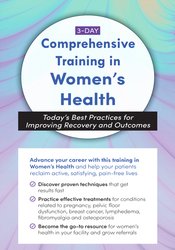
Get immediate lifetime access to this content by purchasing the digital seminar/online course instead that you can access using a variety of devices, and one CE certificate is included with purchase! Click the “Digital Seminar” or "Online Course" link below to learn more!
DVD Purchasers please note: In order to view the content, you will be required to have a DVD player or a DVD drive on your computer. Your CE is a separate fee.

Women’s bodies go through a lot in a lifetime. Add the stresses and strains of pregnancy, childbirth, surgery, and trauma can lead to many problems, from pelvic floor disorders and lymphedema to back pain and bone loss.
Without specialized training in the unique needs of women, you could be leaving your patients misunderstood, misdiagnosed, undertreated and underserved – failing to end their pain, missing an opportunity to restore wellness to their lives, and leaving them to face the risk, discomfort and cost of unnecessary surgeries.
This intensive training course recording will provide you with today’s most innovative treatments to help women reclaim active, satisfying, pain-free lives.
Watch and bring valuable additions to your clinical toolbox that will allow you to implement advanced treatment plans for the most common issues women face, including pregnancy/postpartum complications, pelvic floor dysfunction, breast cancer, lymphedema, fibromyalgia and osteoporosis. What’s more, you’ll leave this training better able to expand your practice, serving as a go-to clinician on issues related to women’s health in rehabilitation.
Leave feeling confident and fulfilled, knowing that you can change the lives of women!
| File type | File name | Number of pages | |
|---|---|---|---|
| Manual (13.08 MB) | 175 Pages | Available after Purchase | |
| CE Test – 063780 – Paper Option (289.9 KB) | Available after Purchase |
Debora Chasse, PT, DPT, WCS, CLT, is an expert in women’s health with over 20 years of experience helping women recover from pregnancy/postpartum complications, pelvic floor dysfunction, breast cancer, lymphedema, fibromyalgia and osteoporosis.
Among the first to receive the APTA’s Board Certification in Women’s Health, Dr. Chasse travels nationally to present seminars on women’s health topics, and she is known for her dynamic, hands-on teaching style. In addition, she has served on the Specialization Academy of Content Experts and was a writer for the APTA pelvic pain certification courses.
Dr. Chasse earned her doctorate in physical therapy from Loma Linda University, where she also began teaching in 2000, and she holds additional certifications in Complete Lymphatic Therapy and Matrix Repatterning.
Speaker Disclosures:
Financial: Dr. Debora Chasse has employment relationships with Function Ability Physical Therapy and Matrix Repatterning. She receives a speaking honorarium from the Matrix Institute. Dr. Chasse receives a speaking honorarium and recording royalties from PESI, Inc. She has no relevant financial relationships with ineligible organizations.
Non-financial: Dr. Debora Chasse is a member of the American Physical Therapy Association.
Access never expires for this product.
Visit our FAQ page at www.pesi.com/faq or contact us at www.pesi.com/info
| 5 |
|
| 4 |
|
| 3 |
|
| 2 |
|
| 1 |
|
Satisfaction Guarantee
Your satisfaction is our goal and our guarantee. Concerns should be addressed to: PO Box 1000, Eau Claire, WI 54702-1000 or call 1-800-844-8260.
ADA Needs
We would be happy to accommodate your ADA needs; please call our Customer Service Department for more information at 1-800-844-8260.
PESI Mobile App
Access CE trainings on your phone or tablet through our free mobile app. Choose video or audio-only versions of online courses from the world’s best instructors, and complete your CE requirements anywhere, anytime, at your own pace.
Please wait ...